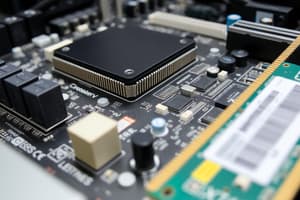Podcast
Questions and Answers
What is the primary function of the Central Processing Unit (CPU) in a computer?
What is the primary function of the Central Processing Unit (CPU) in a computer?
- To store data permanently
- To manage network connections
- To display graphics on the monitor
- To process data and instructions (correct)
Which of the following correctly describes Random Access Memory (RAM)?
Which of the following correctly describes Random Access Memory (RAM)?
- It permanently stores data even when the power is off
- It is used primarily for network data management
- It serves as the primary input device for users
- It temporarily stores data and loses it when power is turned off (correct)
Which type of computer is specifically designed to provide services to multiple users?
Which type of computer is specifically designed to provide services to multiple users?
- Mobile Device
- Server (correct)
- Personal Computer
- Embedded System
What is the main role of an operating system (OS)?
What is the main role of an operating system (OS)?
How do computers represent data internally?
How do computers represent data internally?
Flashcards
What is the CPU?
What is the CPU?
The brain of the computer, responsible for processing data and instructions.
What is RAM?
What is RAM?
A type of memory that temporarily stores data being used by the computer, and is lost when the power is off.
What are operating systems?
What are operating systems?
Software programs that manage a computer's hardware and software resources, providing a platform for applications to run.
What is software?
What is software?
Signup and view all the flashcards
What is a computer network?
What is a computer network?
Signup and view all the flashcards
Study Notes
- Computers are electronic devices that store, retrieve, and process data.
- They follow instructions (programs) to perform various tasks.
- Core components are the CPU (processes data/instructions), RAM (temporary storage, lost on power off), storage (permanent storage like hard drives/SSDs), input (keyboard/mouse), and output (monitor/printer).
Types of Computers
- Personal Computers (PCs): Desktop and laptop computers for individual use.
- Servers: Powerful computers for providing services (internet/data storage) to multiple users.
- Mobile Devices: Smartphones/tablets for portable computing.
- Embedded Systems: Computers integrated into other devices (cars/appliances).
- Supercomputers: Extremely powerful machines for complex scientific calculations/simulations.
Operating Systems
- Operating systems (OS) manage computer hardware and software resources.
- Examples include Windows, macOS, Linux, and Android.
- The OS provides a platform for applications and user interaction.
- OS manage tasks, prioritize execution, allocate resources, and protect data.
Software
- Software are programs instructing computers for specific tasks.
- System software (OS) manages hardware/resources.
- Application software (word processors/games) provides specific functionalities.
- Software includes proprietary (licensed) and open-source (free/modifiable) types.
Data Representation
- Computers use bits (0s and 1s) to represent data.
- Bits group to represent characters, numbers, and instructions.
- Data structures efficiently store and retrieve data.
Computer Networks
- Networks connect computers to share resources (files/printers).
- Networks range from LANs (local area) to WANs (wide area) connecting across countries/continents.
- The Internet is a global network connecting millions of computers.
History of Computers
- Early computers were large room-sized machines.
- Advancements led to smaller, faster, and more powerful computers.
- Key milestones include transistors, integrated circuits, and microprocessors.
- Continued advancements improve speed, storage, and energy efficiency.
Ethical Considerations
- Computer use raises ethical issues regarding privacy, security, responsibility.
- Data security, online safety, cybersecurity, and malware require proactive measures.
- Ethical use of computers is crucial.
Future Trends
- Artificial intelligence (AI) and machine learning are changing the computer field.
- Cloud computing allows remote data access/storage.
- Quantum computing offers massive future computational power.
- Hardware/software innovation continually improves computer performance/capabilities.
Studying That Suits You
Use AI to generate personalized quizzes and flashcards to suit your learning preferences.




